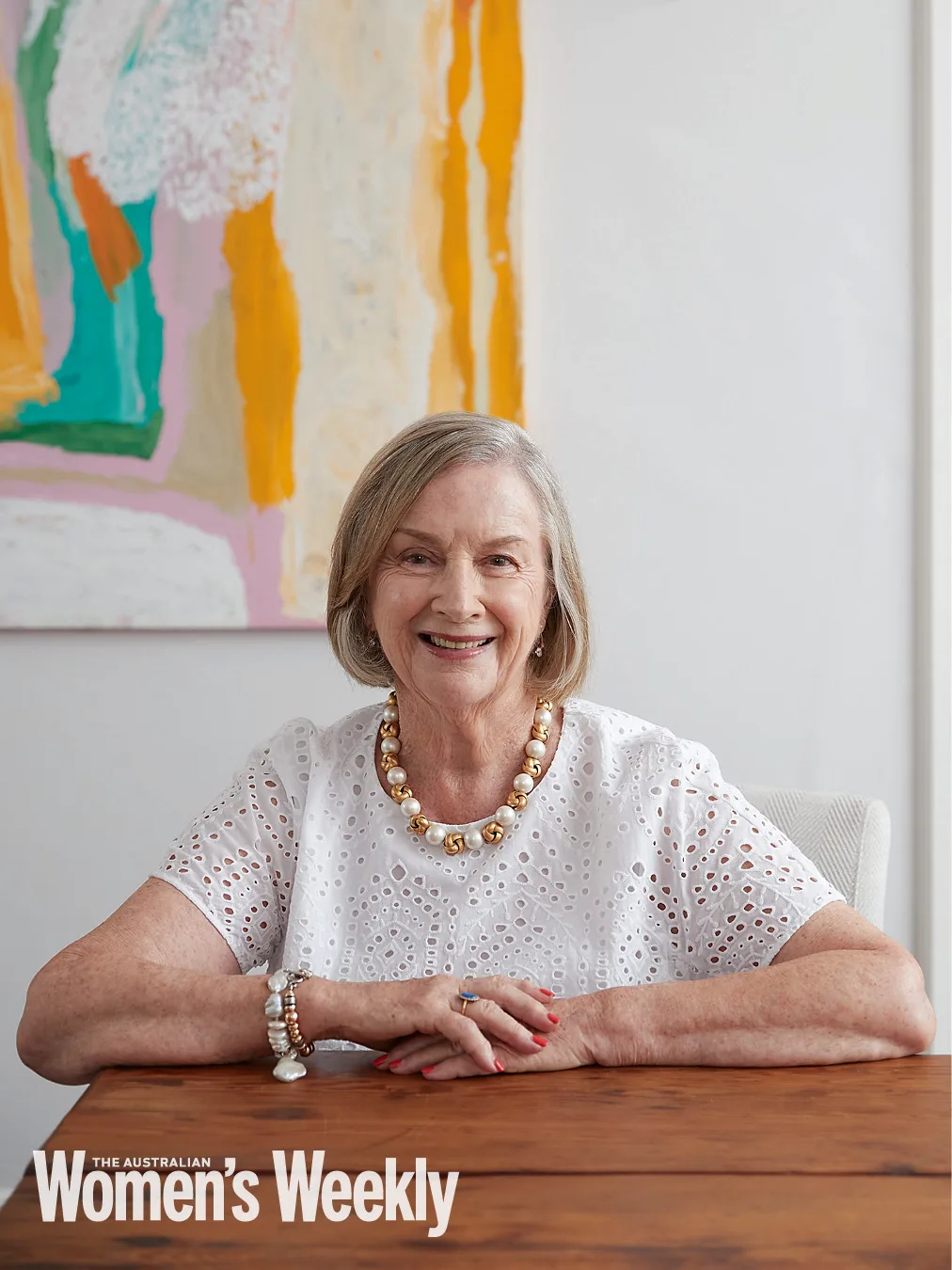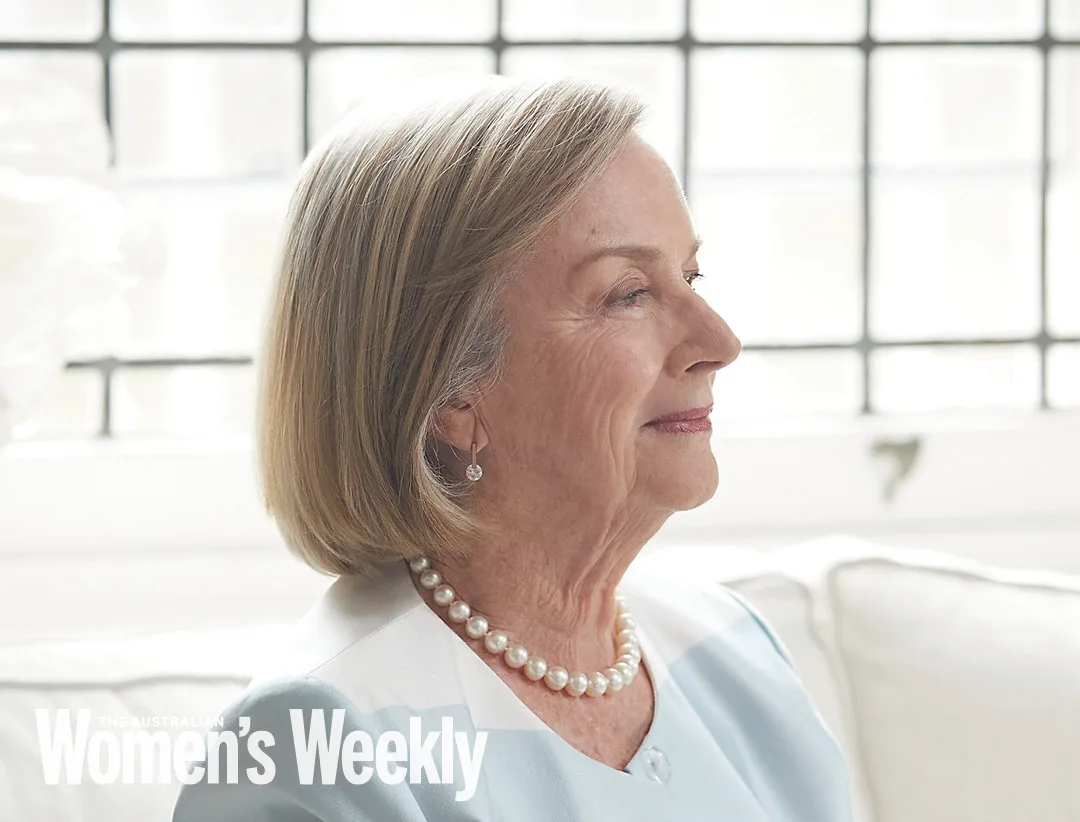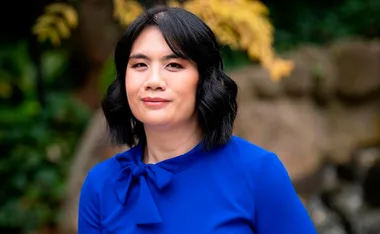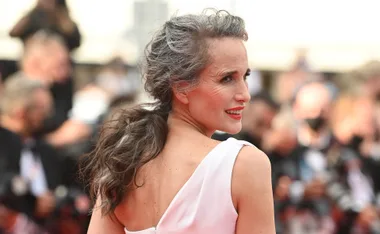My mother’s greatest fear was always that I would attract too much attention to myself, and be part of the story,” muses Wendy McCarthy.
We are sitting in her elegant Sydney home, the walls decked in original Australian art each with a personal story attached, including mesmerising side-by-side paintings of Wendy, age 19, and her mother, age 37.
“She was 18 when I was born. We sort of grew up together and I was probably the perfect first baby and older child because I took responsibility in the family,” Wendy explains, remembering how she and her siblings all sat for artist Louise Cornwall to paint their portraits.
The twinkle in Wendy’s eye as she recalls one of many contradictory life lessons from her mother hints at its inherent irony, for this indomitable Aussie is of course well known for attracting a great deal of attention as a trailblazing feminist, activist and boardroom mover and shaker.

“She was egging me on in some ways.” Wendy speaking about her mother’s views on her feminism.
(Photo: Julie Adams)But back then, for Betty [she was actually christened Audrey but hated the name so became Betty as a child and Bette or Bettina as an adult] respectability was everything and her eldest daughter’s involvement in the burgeoning feminist movement of the ’60s and ’70s was a little too outré.
“It was not her passion,” smiles Wendy. “However, she would say things to me like, ‘Well, you know that’s not true, why don’t you do something about it?’ She was egging me on in some ways.”
Wendy’s determination to tackle convention can hardly have surprised her mother though, for – as I soon learn – she’s been an independent thinker since she was a young girl.
Evidently not long after a three-year-old Wendy started school at Trinity Grammar kindergarten in Orange, NSW, its principal, the fabulously named Mrs Pender-Brooks, summoned her parents for a crisis summit to discuss a grave delinquency in their daughter. That her father was called in as well as her mother struck fear into the Ryan household.
“That’s what a huge crime it was. My mother says she was terrified.”
In the bluestone church hall where lessons took place, the much-admired Mrs Pender-Brooks revealed that Wendy was writing with her left hand and she resolutely refused to listen to reason. Consequently, her future educational development was teetering on a precipice.
“It could be a terrible handicap to her,” posited Mrs Pender-Brooks.
“The teachers kept taking the pencil out of my hand and they would smack my hand and put it into the other hand. But I would have none of it … So my father was called,” says Wendy. “Apparently, he looked at the principal and said, ‘I wouldn’t try changing her mind, she is very determined’.”
Wendy says she remembers listening to the principal and then quietly but firmly choosing her own path. “I think I had an innate sense of what was right for me,” she says. “I remain left-handed and not visibly damaged by it.”
It’s a story Wendy tells in her gripping new memoir, Don’t Be Too Polite, Girls, its saucy title recalling the famous Glen Tomasetti song from 1969, the refrain of which could well be an anthem for Wendy’s life.

Wendy graduated from the University of New England in 1961.
(Photo: Supplied and used with permission)“Don’t be too polite girls, don’t be too polite/Show a little fight girls, show a little fight/Don’t be fearful of offending, in case you get the sack/Just recognise your value and we won’t look back.”
Wendy’s early act of rebellion offers a glimpse of the reasoned confidence that would catapult this naïve country girl from a loving but often tricky and turbulent childhood into commanding positions previously not open to women.
En route she would inspire young minds as the sort of teacher we all wish we’d had, fight for women’s rights and tenaciously persuade – mostly male – politicians to legislate change.
Wendy’s descriptions of her family eking out a living on a 1000-acre soldier settlement block in the tiny village of Garema, staying first in a tent and then in shearers’ huts until they could afford to build a house, are in stark contrast to the world she has inhabited as an adult.
But that country childhood is what shaped her. She would cycle to school and when the road was wet, ride her pony, Stella. In the one-teacher school Wendy adored her lessons and away from school would lose herself in books and run free in the Aussie dirt.

Wendy pictured at her home in Sydney.
(Photo: Julie Adams)“It has a physicality about it, I respond to an earthy environment,” she says. “Even as a child, my horizon was limitless in a physical way because we lived on the plains. I am really a person of rural Australia. That is where my heart and soul are.”
Wendy says they never saw themselves as poor or struggling, but it certainly wasn’t easy. Money was scarce and as the family grew, she watched her father, William ‘Bill’ Rex Ryan, who worked as a grazier, continually try to escape his domestic responsibilities.
“I don’t think he played his part. He left everything to my mother and with reduced resources. If the role was for the man to provide, he didn’t provide adequately or support her. But we’re speaking 21st century language about something that was probably just the norm in Australian families at the time,” she surmises.
“My father was an enchanting character for the first five or six years of my life. He was a storyteller, he was fun, he danced, he sang, and then by the time the second child came, when I was about four, he started drinking.”
Betty had left school at 14 “and four years later she was a mother,” sighs Wendy. “My mother absolutely set her eyes on my father, who lived across the road from her growing up, and it was not a wise choice.”

Wendy pictured with her mother, Betty.
(Photo: Supplied and used with permission)Wendy was aware of an air of fear and menace when her father was drunk and wanted to protect her mother.
“I felt responsible as a child. If there were signs that he was coming home under the influence, I’d make sure that my two siblings were in bed, so that if he lost it for some reason, they wouldn’t be in the room.”
There was no question of reporting the abuse.
“I wouldn’t have had the faintest idea that it was possible nor that it was a crime,” says Wendy. But her mother did confide in a couple of local families.
“They could see my father was unreliable and they would check in.
“He alternated between being the hero in the floods, floating his truck across the water, which we thought exciting and wonderful, to being someone who was menacing in his manners, when he was drunk. What I knew is that my family was pretty good when my father was in good form and when he was not, for whatever reasons, he was broke or the wool crop was bad or he’d been drinking for three weeks on a bender and hadn’t come home, there wasn’t much around for my mother to eke out, but I can’t ever remember a time when there wasn’t food on the table.”

Wendy pictured with her siblings and father.
(Photo: Supplied and used with permission)As a family they made the best of things. And for Wendy it was just normal life but she did glean a key life lesson.
“In terms of where men fitted into families, I knew I was never going to couple up with someone who didn’t share all the responsibilities that go with being a couple and being parents.”
This she achieved with husband Gordon … as we’ll get to.
Another thing Wendy learned was self-sufficiency and resilience. She was 11 when she left home to board at St John’s Anglican Hostel, next to Forbes Intermediate High School.
It was usual for country kids to leave home for education and at the hostel she was one of 40 boarders – 20 girls and 20 boys. Overseeing them was the warden, Anglican minister Don Shearman, who they called “Padre”.
Wendy was really happy there. She excelled at school and was naturally sociable.
But years later she discovered that one of her friends was being groomed and sexually abused by Shearman.

Wendy left home at 11 to board at St John’s Anglican Hostel
(Photo: Julie Adams)“I had no awareness of what was happening,” says Wendy. “One day she disappeared. Expelled. It was said that she had been ‘promiscuous’ – I had to go and look up that word. None of us could make sense of it.”
When she was 15, Wendy left the hostel. In financial straits, her family had lost their farm and she had to finish school in Tamworth.
“There, my teachers encouraged me to apply for Teachers College and Commonwealth scholarships.”
Her father refused to sign the guarantee form but her mother was determined and with the help of an aunt lodged the application. Wendy was granted a scholarship and at 16 was off to the University of New England. Her new life had begun.
“It was sex and drugs and rock and roll. Well, not drugs, except for nicotine. I learned to smoke,” Wendy laughs.
She loved university right from the get-go and most of all was blown away by the leadership of women.
“They were mostly single and they had an autonomy about their lives,” she recalls. “Exceptional bluestocking women. I’d never seen one before. There was a respect for a woman of letters. I felt that. That collegiate experience was profound for me in terms of developing feminism.”
But back at home her father’s life was spiralling out of control.
“My grandmother took him in and then his sister for the last painful year,” Wendy says. At the age of 43 Bill died.
It was a terrible waste of a life, but Wendy remembers she felt relief.
“That was my first emotion. ‘Oh, thank God!’ No more anxiety, mixed loyalties and sadness, the whole sense of his pain. By then I’d done a bit more educational psychology and I understood more. This man was in pain and my mother was in pain.”

“But it was just a relief that this shadow in our lives was at peace.” Wendy speaking about her father’s death.
(Photo: Julie Adams)Betty was already leading her own life and mother and daughter were caught up in their own worlds. This was a welcome full stop for them both.
“My mother was separated from him by then and living in Sydney. Through my father’s death she met the lawyer whom she subsequently married. But it was just a relief that this shadow in our lives was at peace.”
Wendy had her first proper boyfriend at university. They were together for two years until a betrayal floored her.
One of her girlfriends sought Wendy’s help to drive her to a doctor in a suitably distant country town because she feared she might be pregnant (she was actually five months in).
It was Wendy’s first encounter with the trauma of unwanted pregnancy. The friend refused to name the man responsible although Wendy discovered by chance that it was her boyfriend. But despite the betrayal she didn’t hesitate to help.
“That is one of the things I’m most proud of. I could see immediately her loss was far, far greater than mine. I was emotionally battered by it, but she needed help because he’d left her, too.”
Wendy admits her own method of contraception at the time was woefully inadequate.
“It could have been me. That’s when you remember those who disappeared. One of the most exquisite girls at uni who was so smart just one day didn’t come back.”
Wendy started to realise the pitfalls ahead for women and how different it was for men. She was thrilled when the university principal appointed her moral tutor, responsible for the pastoral care of 16 young women.
“She said ‘I want you to look after this scrappy group of girls. They’re young and inexperienced. A lot of things that have happened to you will happen to them and I need you to care for them.’ Most of us were from rural properties. We didn’t have the sociability of the kids from towns. I made sure my door was open. I was unshockable. I never gave up on a kid.”

Wendy at a Women’s Electoral Lobby meeting in 1972
(Photo: Supplied and used with permission)This was Wendy’s first taste of leadership and she had found her metier. After college she became a teacher and that passion for helping and guiding young minds blossomed.
“The ones who were seen to be troublemakers and naughty girls would always turn out to be the best leaders, the independent thinkers.”
Wendy met Gordon McCarthy on a blind date in September, 1963.
“From that moment he became the most important person in my life,” she writes. She fell in love deeply and that never changed. They got engaged but put off the wedding at Bette’s request.
“My mother announced that she was pregnant and there would not be a wedding while she was pregnant, so we deferred for a year,” says Wendy.
But then Wendy discovered she was also pregnant.

Wendy and her husband Gordon
(Photo: Supplied and used with permission)“It was panic stations. There was never a question that we would continue with that pregnancy. It was not the right time,” says Wendy.
Abortion was illegal but not impossible.
“Gordon went on the search and we found a place. We had the appointment, I phoned in sick at work and off we went. I was 22 and about seven weeks pregnant.”
0It was all very cloak-and-dagger. Wendy made phone calls from public phone boxes at prescribed times and then had to present 63 guineas in cash.
“In 1964 that was a lot of money,” she recalls.
From the outside, the building where surgeons were performing back-street abortions looked like an ordinary red brick apartment block.
“The only thing you would notice were the cops’ cars cruising past every now and then. Gordon parked across the road and I went up the stairs. There’s a little keyhole grill. You identify yourself, pass the money through and they count it, while you’re standing at the door.
“Inside, I was prepped and they asked ‘are you allergic to anything?’ I said, ‘yes, cocaine’. I’d known that since I had a terrible reaction to a cocaine dental block. They said, ‘that’s what we use but it’s okay, we’ll do it without anaesthetic’. And they did.”
Wendy was well aware that if she’d been caught she could have been sent to jail for 10 years.
“I put it behind me and when I went to doctors for family planning reasons I never told them. You were always asked, ‘Have you had a previous pregnancy?’ I’d say ‘no’.”
1Wendy told the world, though, in 1972 when she was involved with abortion law reform.
“A group of us decided to put an ad in what was then the Nation Review, which was a lively paper funded independently. We said to the police, we have all had illegal terminations and we ask that if you want to prosecute these things you start prosecuting us. Well, there were 80 names that were pretty well-known.”
Wendy finally achieved that reform in NSW almost 50 years later.
Wendy and Gordon married in December, 1964, and headed off to the UK and then the US. It was another period of learning as she met more inspirational women and worked in schools.
She returned to Australia with six years of teaching experience across three continents and made an appointment with the NSW Department of Education to discuss her options.
But Wendy was told that not only would her teaching overseas not be recognised when determining her starting pay, she would only be considered for casual positions. She was pregnant with her eldest, Sophie, and apparently that meant permanent employment was impossible.
It made no sense at all and in many ways was the catalyst for what became a lifetime of feminist activism. The rest, of course, is history.
Wendy became a member of the Childbirth Education Association and a co-founder of the NSW branch of the Women’s Electoral Lobby.
2
Wendy with Prime Minister Bob Hawke
(Photo: Supplied and used with permission)“We wanted to make a record of the views of people standing for parliamentary election in the 1972 election to see how aligned they were with the ideas we were exploring about what it was to be a woman in Australia,” says Wendy. “Most of them had never, ever thought that there were women’s issues. They didn’t care that there was a cosmetic tax on the Pill, that girls were not finishing school. They didn’t see that there was a problem being female in Australia. And we did.”
In a questionnaire, the Lobby exposed the flagrant sexism informing the nation’s wannabe politicians.
“Still my favourite is in my local area, North Sydney, Sir John Cramer, who said a woman’s greatest attribute for public life is that she still has her virginity. We’re talking 1972!”
In 1975 Wendy became the Education and Media Officer for Family Planning NSW, followed by CEO of the federal family planning body.
While on the National Women’s Advisory Council she talked to government. Such work highlighted Wendy’s ability to problem solve, negotiate and effect change and her subsequent career working on boards, including Deputy Chair of the ABC, was a testament to those talents.
Throughout it all her mother’s remarks about attracting attention have remained with her.
“It’s still one of the tape measures I put over decisions I make – is this about me, is it about the issue, how will it be seen? And I do know that at a subconscious level I still am concerned if I’m seen to be too pushy. But I’m not the slightest bit worried about putting my foot down.”
To today’s activists Wendy says keep stamping your foot and never underestimate the power of a good demonstration.
“If you care enough about something to walk the streets for it, you’re going to care about it for most of your life.”
The most poignant result for Wendy has been women finding their voices.
“You don’t shut too many women up any more, and many of us would have crept back into our caves in earlier days. I think having our voice respected was a big win, that and education for women. But the lesson we need to remind ourselves of is that when you win things, you have to mind them. You can’t just assume things won’t revert.”
In 2017 Gordon died. He had just given up his beef farm and after 34 board positions Wendy was hoping they could chill together in Sydney.
It was a terrible shock and the grief was crippling.

Wendy McCarthy addresses the audience at a state memorial service for the late Hazel Hawke in 2013.
(Image: Getty)“I think I’ve only just come to terms with the fact that he’s not coming back. I’m going to be on my own. But I’m a pretty lucky person.”
At her 80th birthday party Wendy gathered friends and family to celebrate. The pandemic prevented some coming but there were still 170, with lots of dancing.
“I can’t believe I’m 80 and still fit. It’s a triumph and a second chance,” she beams. “I don’t know what I want to do but I’m really loving my life now and I’m not sad.
“I’ve learned to live in a mindful way, before that word was used. It may be more that I don’t like being controlled by grief or other people. It’s important to me to have my sense of self and autonomy. And now I’m sitting here and thinking, well, life looks pretty good. Julia Gillard wrote this lovely thing in support of the book, saying ‘Wendy, the best is yet to come’. I know there’s something over the horizon. I do still have a sense that I’m not done yet.”

Wendy McCarthy’s memoir Don’t Be Too Polite Girls from Allen & Unwin is available from March 1, 2022.
You can read this story and many more in our March issue of The Australian Women’s Weekly – on sale now


.jpg?resize=380%2C285)




